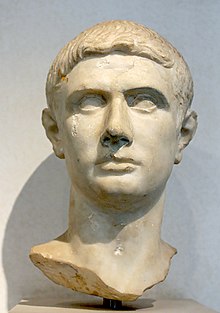 |
| Marble bust of Brutus, at the Palazzo Massimo alle Terme in the National Museum of Rome (Wikipedia) |
(Plutarch 604)
This passage displays the difference between a "good" man and a "great" man. Plutarch is not particularly interested in the moral capacity of his subjects, but thir ability to lead. even though he notes the destruction caused by Caesar and Anthony, Plutarch considers Brutus to have this major flaw, because he had to make the reward of plunder an incentive for good behavior from his troops, rather than a reward for a job well done.
No comments:
Post a Comment